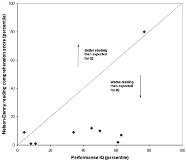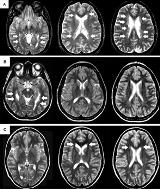A DEFECT IN NEURONAL MIGRATION RESULTS IN A DYSLEXIA-LIKE PHENOTYPE
Abstract number :
2.087
Submission category :
Year :
2004
Submission ID :
4610
Source :
www.aesnet.org
Presentation date :
12/2/2004 12:00:00 AM
Published date :
Dec 1, 2004, 06:00 AM
Authors :
1Bernard S. Chang, 1Jenny Ly, 1Adria Bodell, 2Barbara Appignani, 1Kira Apse, 1Robert S. Ravenscroft, 1Volney L. Sheen, 3Michael J. Doherty, 2David B. Hackne
Patients with malformations of cortical development, a common cause of epilepsy, offer opportunities to characterize the effect of developmental disruptions on human cortical anatomy and function. Periventricular nodular heterotopia (PNH) is a neuronal migration disorder associated with seizures and, in most cases, normal intelligence. We sought to define the cognitive phenotype of PNH and correlate our results with the anatomical and clinical features of the disorder. Ten consecutive PNH subjects, all with epilepsy, were studied with structural neuroimaging and neuropsychological screening. T1-weighted, T2-weighted, and 3D-MPRAGE MR images were acquired on 1.5T and 3T scanners. Cognitive testing assessed general intellect, executive function, attention/working memory, learning/memory, written achievement, and reading/phonology. Eight subjects (80%) demonstrated prominent deficits in reading abilities despite the presence of normal intelligence, attention, and working memory (figure 1). Affected subjects showed variability in the number, size, and location of their heterotopias (figure 2). However, more marked reading difficulties were seen in those with widely distributed heterotopias. There was no correlation with epilepsy severity.[figure1][figure2] Our results suggest that a generalized disorder of neuronal migration can lead to a specific functional deficit while sparing most global cognitive abilities. There is accumulating evidence that dyslexia, or specific reading disability, is a developmental disorder associated with subtle variations in structural brain anatomy. We demonstrate that a striking alteration in brain architecture can result in a similar pattern of cognitive deficits. (Supported by the Clinical Investigator Training Program of BIDMC and Harvard-MIT in collaboration with Pfizer. C.A.W. is an Investigator of the Howard Hughes Medical Institute and was supported by NINDS and the March of Dimes.)

